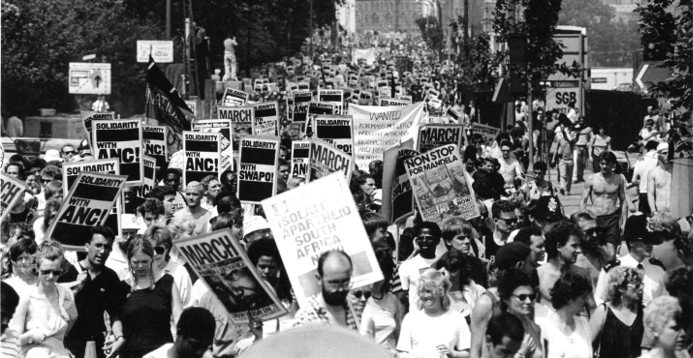
1959: The Formation of the Anti-Apartheid Movement
The AAM was officially founded in 1959, marking the beginning of organized resistance against apartheid in Britain.
The movement emerged from smaller anti-apartheid groups, and its formation was largely a response to the Sharpeville Massacre in South Africa, which shocked the world when police opened fire on peaceful protestors.
1960s: The AAM's Formative Years
In the early 1960s, the AAM focused on raising awareness about apartheid, organizing protests, and advocating for sanctions against South Africa.
Campaigns, such as the boycott of South African goods and the call for a sports boycott, gained momentum during this decade.
1970s: Expanding the Movement
The 1970s saw the AAM broaden its scope, appealing to a wider range of supporters. It engaged with trade unions, faith groups, and cultural organisations.
The boycott of Barclays Bank, which had investments in South Africa, became a focal point of the AAM's economic campaign.
1984: London Recruits
A secret campaign known as the “London Recruits” came to light. This was an initiative in which British activists travelled to South Africa posing as tourists to help the African National Congress (ANC) distribute underground propaganda.
1984-87: The Dunnes Stores Strike (Dublin)
The Dunnes Stores strike, though in Ireland, gained international recognition when Irish workers refused to handle South African produce as a protest against apartheid. The strike had a profound impact on British activists, inspiring similar actions.
19.7.1986. Dublin, Ireland. On the Dunnes Stores picket line, Dunnes Stores striker Many Manning with Kadar Asmal and Louise Asmal from the IAAM (Irish Anti Apartheid Movement). ©Photo by Derek Speirs (Image use subject to licence - credit photo Derek Speirs)
1986: Comprehensive Sanctions Campaign
The AAM intensified its call for comprehensive sanctions against South Africa, including an arms embargo and economic restrictions.
At a mini summit in London, six of the seven commonwealth leaders present signed up to a programme of economic sanctions. The United Kingdom, led by Mrs Thatcher, declined to sign.
1990: The Release of Nelson Mandela
Nelson Mandela’s release from prison in February 1990 was a pivotal moment for the anti-apartheid movement globally and marked the beginning of negotiations to dismantle apartheid.
1990: The Decline of Apartheid
With negotiations underway, apartheid laws were gradually repealed, and Nelson Mandela was freed to lead the country toward democracy.
1994: South Africa’s First Democratic Elections
South Africa held its first democratic elections, allowing citizens of all races to vote, culminating in Nelson Mandela’s election as president.

